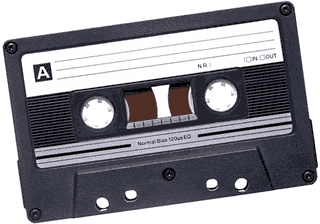It isn’t as easy as ripping MP3 or AAC files from your CDs, but it is possible to digitize your old tapes and records so you can listen to them with iTunes.
Okay, let’s be up front about this so you’re not disappointed. I am not an audiophile, and my taste in music and ability to discern subtle differences in audio quality is minimal at best. I don’t own a lot of music, and I don’t plan on spending a lot of money to convert the old cassettes and LPs I have to a format that iTunes can use.
I just want to be able to have all the music I own playable by iTunes so I can eventually dump it on the iPod I’m saving for.
 Here is what I used to capture my first cassette and import it into iTunes. Many, many other combinations of hardware and software will work.
Here is what I used to capture my first cassette and import it into iTunes. Many, many other combinations of hardware and software will work.
First, I scavenged a mini-plug audio cable used to connect an old PC’s audio card to its external speakers. I used this to connect the headphone jack of my cassette player to the audio input port on my PowerBook G4.
The next step was to tell the PowerBook that the audio input is from the line in rather than the internal microphone. This is done in the Sound panel in System Preferences in OS X. You can adjust the gain on the input with a slider. It should be set somewhere in the middle.
Now you can play music on the cassette player and hear it play through on the computer’s speakers. Cue up the music you want to record.
Start up iMovie and begin a new project. Next, click the Sound button. I’m using iMovie 3. I expect this will also work in OS 9 and with earlier versions of iMovie, although the details may be different.
In iMovie 3, there is a record button. I click the record button and then start the external music source. (If you use the pause button rather than the play button to start the music, you can avoid annoying clicks in the audio stream.) If there is an unusually long delay you can always edit it out with iMovie later. There is a 10 minute limit to the amount of sound you can record in this manner, but this should enable you to capture all but the longest songs.
Once the sound is recorded, you will need to tell iMovie to “extract the audio” so you can export and edit it. You can get stuck on this point unless you remember to select the audio clip before extracting it.
Next, export the clip. Normally this is a video export, but now it is just audio. When exporting, choose the QuickTime format and select expert settings. You can choose to export sound to AIFF or other formats. More compression means your file uses less hard drive space – but also a loss in quality. I think it would take considerable loss before I would notice a difference. AIFF with no compression is about the largest size file you can select.
iMovie exports the entire movie, not just the selection, so make sure you have a single track with extra dead air trimmed before exporting.
Now you can open iTunes, drag the sound to the library, and it will be copied to the library. You can access it as you normally would. You’ll have to enter the database information manually.
Alternatives
One of the nice things about the Mac is that you can do things many different ways. You can connect nice audio decks to some USB something-or-other with RCA cables and postprocess with hiss reduction or whatever. For me, going from crappy cheap audio tape to digital music on my Mac has been a tremendous step forward, and it’s good enough for now. If you need to get deeper into the subject, I recommend these websites:
Ambrosia Software’s Freebies
This has Ambrosia Software’s utility for capturing audio streams processed through your computer, regardless of the source. The only thing it won’t capture is audio from external devices.
Rogue Amoeba Audio Hijack
This is a more sophisticated version of the above and allows audio capture of external signals. It isn’t free, however. There is a trial period version on the site.
Both of these programs will allow you to capture audio you probably couldn’t otherwise. Be advised that you should only capture audio of music that you own.
MacMusic
Probably the best site I ran across in my brief searches was MacMusic, which contains all sorts of links to all kinds of sophisticated information and has helpful forums, too.
For more on this subject, see Digitize Your Albums and Cassettes with Your Mac.
Keywords: #digitizemusic #itunes #maclabreport
Short link: http://goo.gl/hs6cZD
keyword: digitizetapesandalbums

